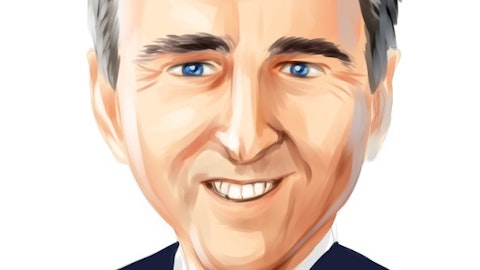Mike Cavanagh: Sure Craig, it’s Mike. I’ll start, and Dave can chime in, if he likes. As we said earlier, we couldn’t be more pleased with the way we performed in the Wild Card Game. It was the biggest live stream event in U.S. history, which is no small feat to have performed so seamlessly, which really highlights what we’ve done in Dave’s business on the broadband side and the technology platforms that we have built and have talked about repeatedly, that are supporting Peacock, Sky and our Xfinity products, and now Xumo, so I think we’ve built tremendous advantage and are always looking for ways to–we’re very happy to see the impact on our broadband usage, regardless of what it means for other ways of getting the platform across.
We couldn’t be happier that it worked well and performed really well with that many concurrent streams. But in terms of adding subs, we would expect to see–we’re not going to comment on it today, but we would expect to see an increase in paid subs. We’re focused now on retention of the subs that came in right around the game. What’s important is both the subs that came in during the game and the engagement of the people that were already don the platform, so engagement and retention is really going to be focused on what’s coming next, and we teased a lot of that, including Oppenheimer coming to the platform on February 16. We have the Summer Olympics coming, and now that we’re post strikes, you’ll see a number of Peacock originals and additional movies from the Pay-1 window that we’ve got with Universal.
But really, when I think about it, at the scale we’ve gotten to, what’s important is to keep people engaged with the platform and all the content that’s there, not the Wild Card Game unto itself, so the job always is to get more people in the door and get everybody that’s already in the door re-engaged with the platform around that game, and then try to continue to drive engagement afterwards. I’m happy to report that we’ve seen record levels of hours viewed in the days that have followed the Wild Card Game itself, including launching Ted, our new comedy series. That’s been the most watched original series for Peacock in its first seven days yet on the platform, which speaks to the benefit of getting that much engagement at the moment we were launching that, and likewise the second season of the reality show, Traitors, premiered right afterwards, and it’s also the biggest original reality season launch for us through its first four days on the platform.
I think that’s the way I look at the total picture there. Brian, I think you want to chime in?
Brian Roberts: I just want to say that we thank the NFL for having the confidence in picking our total company to carry this out. The entire industry cooperated and participated, and it was a very proud moment for, I think, the U.S. internet industry. It worked flawlessly, and I think it’s just another proof point of all the investments that have been made. Thank you again, we’ll see how the results all turn out, but we’re really, really pleased.
Marci Ryvicker: Thanks Craig. Operator, next question, please.
Operator: Thank you. Our next question today is coming from Jessica Reif Ehrlich from Bank of America Securities. Your line is now live.
Jessica Reif Ehrlich: Thank you. Mike, I have a two-parter. As Brian just said, you have a unique mix of assets, so can you talk a little bit about your longer term video strategy from all sides of the company, from both cable and NBC-U, meaning do you have any plans to take Peacock global, your recent Paramount affiliate renewal deal kind of seems like status quo? Then as a separate question, you kind of touched a little bit on Epic. It’s only one year away. Can you give us some color on size and scope and how differentiated the offering will be? Thank you.
Mike Cavanagh: Hey Jessica, thanks. On Peacock in particular, let’s take video in a couple of pieces. On our streaming ambitions, clearly we view it, and we’ve talked about it for a long time, we want our existing media assets to have a strong future in a world where consumer behavior is taking people more to streaming, because that’s the way they want to experience it, so our strength, obviously in video distribution from the NBC side, has been U.S. focused, and I think we are focused–very focused on getting domestic scale. What we’ve done internationally and what we might do one day is a separate story, but for now, we have been focused on making sure through partnerships, JVs, whether it’s Sky Showtime, whether it’s Peacock-type content that makes its way onto Sky platforms, we’ve got a venture partner in MultiChoice in Africa, so we’re looking for ways and a rational approach economically to scale up Peacock domestically while not giving up too much in terms of economics that a lot of people talk about as having global scale.
We want to win here first and get to the place we need to go, and that’s really where we’re most focused. In terms of what’s happening on the domestic side through video distribution, I think we continue to be a big player in the space with our own content from NBC, but also I think the best partner given the scale of our reach in broadband for both traditional linear, but at the same time streaming partners. We’ve seen a lot of progress and a lot of collaboration with players and partners that want to reach the kind of customer base we have with our broadband customer base, the natural point of engagement with them, aggregating content and acquiring new content if they don’t have it through Xumo, X1 and the platform that Dave and team have built.
I think we’re really well positioned to play a part in that as well.
Dave Watson: And Jessica, this is Dave. I just would add, when you think about the overall video approach, it’s linear, streaming, on-demand, still DVR. It’s all of them that I think we are in a unique position to be able to tie together. Back to the Wild Card Game, it’s an example of great broadband being able to handle it, and at the same time what’s really important in video is the experience matters. The experience getting connected to the overall network performance is so critical, finding what you want easily and simply and being able to engage. The platforms that we’ve built over time, starting with X1, now Xumo, very important to us in the long run.
Brian Roberts: One thing I would add – it’s Brian – on Epic, just to touch on that part of the question. It’s completely original. It maybe the most exciting project, I’ve seen since we bought NBC-Universal getting built. I think it’s the first new entire theme park in decades in the U.S., and we’re so excited, we’re taking the board of directors to see the construction in the next couple of weeks, which is something we haven’t ever done before. So, I think you’ll all want to be there. Sometime, I think ’23 and ’24, are the peak CapEx years for the construction. We expect to open in ’25, and I give Mark Woodbury and the entire team at Universal incredible kudos to coordinate something of this scale and magnitude that’s being built.
Marci Ryvicker: Thanks Jessica. Operator, next question please.
Operator: Our next question is coming from John Hodulik from UBS. Your line is now live.





